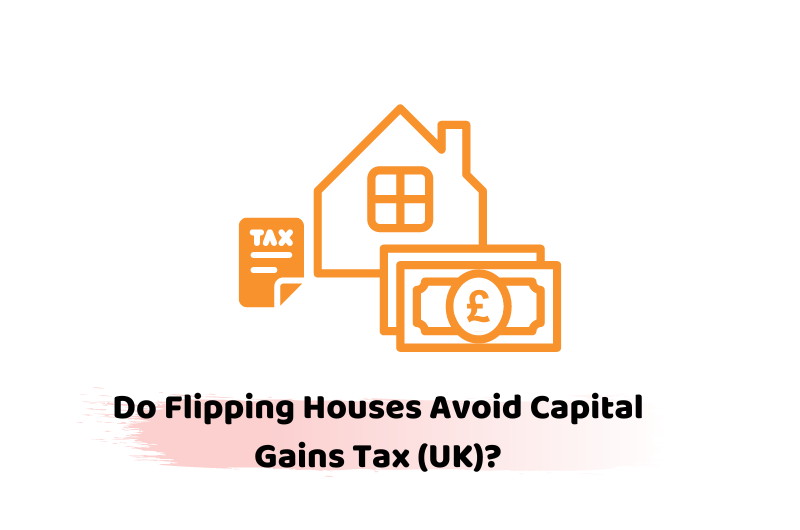Do flipping houses avoid Capital Gains Tax in the UK? If you are the one who is enquiring about the same matter, you are on the right page, and we would love to answer your queries. The flipping of houses which means selling and buying houses for the sake of profits is a rising way of earning profits these days. However, there are a few certainties you will have to consider so that your flip house does not become a flop for you. It is wise to get a grip on a tax implication that is potential.
Even though you are interested in getting information about making a living or earning a few pounds by letting your property, we have got you covered with everything that you need to know about flipping houses to avoid CGT in the UK.
Are you confused about does flipping houses avoid Capital Gains Tax in the UK? Please talk to our accredited accountants and tax advisors.
Do Flipping Houses Avoid Capital Gains Tax in the UK?
Capital gains tax is a kind of tax that you will have to pay when you are selling your property for the sake of profits. Cryptocurrency, shares, or property are a few examples of such selling businesses. According to HMRC house flipping is not considered an investment, this means you are not liable to pay CGT while you plan house flipping or selling your asset to earn a number of profits.
However, there are a few other taxes that you will have to manage with this process. Be clear about whether you aim to sell your property or put it on rental income for tenants. This is because the rental property can be subject to CGT.
Importance of House Flipping – Is It Worth It?
The flipping of properties has experienced a visible rise since the world experienced the pandemic and it kept on rising even after the pandemic to date. People around the world have used TikTok and other such platforms to showcase their properties, relevant offers, firsts time flippers and renovations.
Moreover, according to research in 2020, around 23,000 properties were successfully flipped even during the duration of the pandemic and the boom has only grown up to be a stronger game in this regard. However, people now enquire if is it worth keeping going with it. This will depend on the cost of renovation and what is the amount you will have to pay in form of tax. The first and prior need is to understand your tax implications relevant to property flipping before you plan to jump into this process.
Pay Income Tax Instead
If you are an individual who is self-employed and also planning to house flipping, you will have to pay income tax instead of CGT. This is because property flipping doesn’t come under the investment as discussed earlier. By this, we understand that as a self-employed individual you will be liable for the responsibility of paying income tax through your self-assessment tax returns.
Planning on Renting Your Property to Tenants – What to Do?
This is also one of the frequently asked questions by people who are planning to property renting for having tenants and make a side earning along with their main jobs. This scenario makes the situation a bit complicated to handle without a professional, however, we have got you covered here as well. You have to realise that property letting is always handled differently than the property flipping process when it is a matter of tax. When you have a plan for your property that involves the process of house flipping and then letting the same house to tenants, you will be liable to pay capital tax gains at the rate of 20 per cent. This is the current applicable rate for such scenarios.
Moreover, the case of high taxpayers will be different as well. As they will have to pay the higher rate which is 40 per cent currently in such a situation of property flipping and then letting. This might sound complicated to many people. You can always use the online calculator to make the process a little simple for you and you will get accurate calculations as well.
In What Case Will I Pay Corporation Tax?
Sometimes people plan on flipping the property through a limited company, this will make them liable to pay the corporation tax instead. This is because such businesses are dependent on the yearly profits they earn. Moreover, if you are the one who aims to flip the property through a limited company, your corporation tax rate will depend on the amount of profit you make within the period of a year.
If your business is making £50,000 or more amount of profits within the period of a year, you will pay corporation tax at the rate of 25 per cent. On the other hand, businesses that are making less than the amount £50,000 as profits within a year, will have to pay corporation tax at the rate of 19 per cent.
The Bottom Line
Now that we have gathered a fair amount of information about do flipping houses to avoid Capital Gains Tax in the UK, we can bring the discussion towards wrapping up. We can say that flipping a property can make you avoid CGT. However, if the property rental income is also a part of the process, you will have to pay the CGT. We hope these few minutes of reading will help you to develop a better understanding of property flipping and relevant tax implications.
Flipping houses to avoid Capital Gains Tax is confusing and you can make a terrible mistake in the calculation. Why not talk to our best tax advisors?
Disclaimer: All the information provided in this article on does flipping houses avoid Capital Gains Tax in the UK, including all the texts and graphics, is general in nature. It does not intend to disregard any of the professional advice.





















































